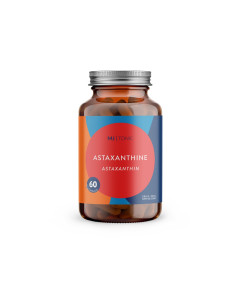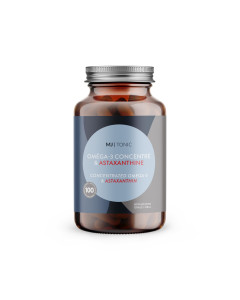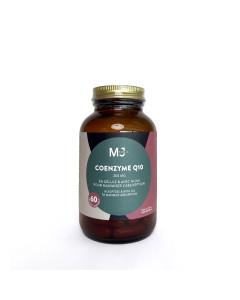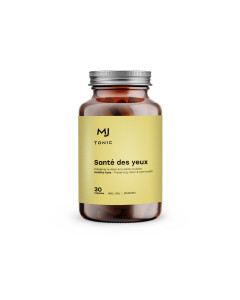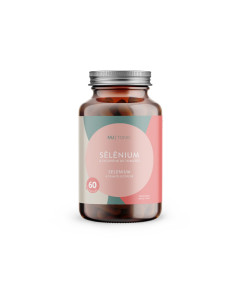Écrit par: L'équipe Maison Jacynthe
| Publié le: 25 mars 2025

Références scientifiques choisies par notre chercheur pour expliquer : astaxanthine - coenzyme Q10 - lutéine & zéaxanthine - Sélénium & lycopène
Astaxanthine
- Ambati, R.R. et al. (2014). Astaxanthin: sources, extraction, stability, biological activities and its commercial applications—A review. Marine Drugs, 12(1), 128–152.
- Fassett, R.G., & Coombes, J.S. (2011). Astaxanthin: a potential therapeutic agent in cardiovascular disease. Marine Drugs, 9(3), 447–465.
- Park, J.S. et al. (2010). Astaxanthin decreased oxidative stress and inflammation and enhanced immune response in humans. Nutrition & Metabolism.
- Yuan, J.P. et al. (2011). The role of astaxanthin in health and disease: a review. Critical Reviews in Food Science and Nutrition.
- Zhang, X., et al. (2022). The effect of astaxanthin supplementation on lipid profiles: A meta-analysis of randomized controlled trials. Phytotherapy Research.
Coenzyme Q10
- Hernández-Camacho, J.D. et al. (2018). Coenzyme Q10 supplementation in aging and disease. Frontiers in Physiology.
- Mortensen, S.A. et al. (2014). Coenzyme Q10 in chronic heart failure: The Q-SYMBIO study. JACC: Heart Failure.
- Saini, R. (2011). Coenzyme Q10: The essential nutrient. Journal of Pharmacology & Pharmacotherapeutics.
- Shults, C.W. et al. (2002). Effects of Coenzyme Q10 in early Parkinson disease. Archives of Neurology.
- Zhai, J. et al. (2018). Effect of CoQ10 on glucose metabolism and oxidative stress in patients with metabolic diseases. J Clin Pharm Ther.
Lutéine et Zéaxanthine
- AREDS2 Research Group (2013). Lutein + zeaxanthin and omega-3 fatty acids for age-related macular degeneration. JAMA, 309(19), 2005–2015.
- Ma, L., et al. (2016). The association between lutein and zeaxanthin status and age-related macular degeneration. Nutrients, 8(9), 617.
- Nolan, J.M., et al. (2013). Macular carotenoid supplementation improves visual performance, especially in glare conditions. J Nutr, 143(6), 771–778.
- Qu, M., Shi, H., Wang, K., Wang, X., Yu, N., & Guo, B. (2021). The associations of plasma/serum carotenoids with Alzheimer’s disease: A systematic review and meta-analysis. Journal of Alzheimer’s Disease, 82(3), 1055–1066. https://doi.org/10.3233/JAD-210384
- Stringham, J.M., et al. (2017). Supplementation with macular carotenoids improves visual performance in glare and photostress. IOVS, 58(9), 3936–3948.
Sélénium & Lycopène
- Césarini, J. P., Michel, L., Maurette, J. M., Adhoute, H., & Béjot, M. (2003). Immediate effects of UV radiation on the skin: Modification by an antioxidant complex containing carotenoids. Photodermatology, Photoimmunology & Photomedicine, 19(4), 182–189. https://doi.org/10.1034/j.1600-0781.2003.00044.x
- Chen, P., Zhang, W., Wang, X., Zhao, K., Negi, D. S., Zhuo, L., Qi, M., Wang, X., & Zhang, X. (2015). Lycopene and risk of prostate cancer: A systematic review and meta-analysis. Medicine, 94(33), e1260. https://doi.org/10.1097/MD.0000000000001260
- Filippini, T., Fairweather-Tait, S., & Vinceti, M. (2023). Selenium and immune function: A systematic review and meta-analysis of experimental human studies. The American Journal of Clinical Nutrition, 117(1), 93–110. https://doi.org/10.1016/j.ajcnut.2022.11.007
- Huang, J.-F., Hsu, C.-P., Ouyang, C.-H., Cheng, C.-T., Wang, C.-C., Liao, C.-H., Wu, Y.-T., & Hsieh, C.-H. (2022). The impact of selenium supplementation on trauma patients—Systematic review and meta-analysis. Nutrients, 14(2), 342. https://doi.org/10.3390/nu14020342
- Huwiler, V. V., Maissen-Abgottspon, S., Stanga, Z., Mühlebach, S., Trepp, R., Bally, L., & Bano, A. (2024). Selenium supplementation in patients with Hashimoto thyroiditis: A systematic review and meta-analysis of randomized clinical trials. Thyroid, 34(3), 295–312. https://doi.org/10.1089/thy.2023.0556
- Jenkins, D. J. A., Kitts, D., Giovannucci, E. L., Sahye-Pudaruth, S., Paquette, M., Blanco Mejia, S., Patel, D., Kavanagh, M., Tsirakis, T., Kendall, C. W. C., Pichika, S. C., & Sievenpiper, J. L. (2020). Selenium, antioxidants, cardiovascular disease, and all-cause mortality: A systematic review and meta-analysis of randomized controlled trials. The American Journal of Clinical Nutrition, 112(6), 1642–1652. https://doi.org/10.1093/ajcn/nqaa245
- Pereira, M. E., Souza, J. V., Galiciolli, M. E. A., Sare, F., Vieira, G. S., Kruk, I. L., & Oliveira, C. S. (2022). Effects of selenium supplementation in patients with mild cognitive impairment or Alzheimer’s disease: A systematic review and meta-analysis. Nutrients, 14(15), 3205. https://doi.org/10.3390/nu14153205
- Sajjadi, S. S., Foshati, S., Haddadian-Khouzani, S., & Rouhani, M. H. (2022). The role of selenium in depression: A systematic review and meta-analysis of human observational and interventional studies. Scientific Reports, 12(1045). https://doi.org/10.1038/s41598-022-05078-1
- Song, B., Liu, K., Gao, Y., Zhao, L., Fang, H., Li, Y., Pei, L., & Xu, Y. (2017). Lycopene and risk of cardiovascular diseases: A meta-analysis of observational studies. Molecular Nutrition & Food Research, 61(9), 1601009. https://doi.org/10.1002/mnfr.201601009
- Kong, X.-Q., Qiu, G.-Y., Yang, Z.-B., Tan, Z.-X., & Quan, X.-Q. (2023). Clinical efficacy of selenium supplementation in patients with Hashimoto thyroiditis: A systematic review and meta-analysis. Medicine, 102(20), e33791. https://doi.org/10.1097/MD.0000000000033791

